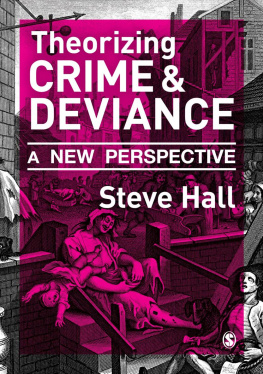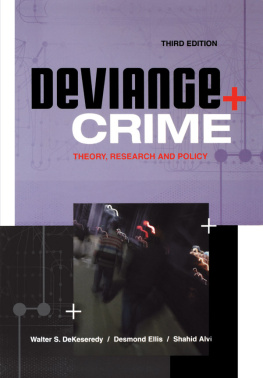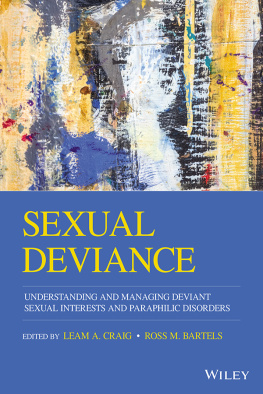First published by Willan Publishing 2002
This edition published by Routledge 2011
2 Park Square, Milton Park, Abingdon, Oxon OX14 4RN
711 Third Avenue, New York, NY 10017 (8th Floor)
Routledge is an imprint of the Taylor & Francis Group, an informa business
The editor and contributors 2003
The right of the editor and contributors to be identified as author of this work has been asserted by them in accordance with the Copyright, Designs and Patents Act of 1988.
All rights reserved; no part of this publication may be reproduced, stored in a retrieval system, or transmitted in any form or by any means, electronic, mechanical, photocopying, recording or otherwise without the prior written permission of the Publishers or a licence permitting copying in the UK issued by the Copyright Licensing Agency Ltd, 90 Tottenham Court Road, London W1P 9HE.
First published 2002
ISBN 978-1-84392-000-7 Paperback
British Library Cataloguing-in-Publication Data
A catalogue record for this book is available from the British Library
Project management by Deer Park Productions, Tavistock, Devon
Typeset by GCS, Leighton Buzzard, Bedfordshire
About the Authors
Yvonne Jewkes is Director of Undergraduate Studies in Criminology at the University of Hull. Her research interests focus on the relationship between the mass media and crime, constructions of masculinities, and prisons and imprisonment. She has published extensively in these areas including, most recently, Captive Audience: Media, Masculinity and Power in Prisons (2002, Willan) and, with Gayle Letherby, Criminology: A Reader (2002, Sage). She is currently writing Media and Crime: A Critical Introduction to be published by Sage.
Rinella Cere lectures in Media and Cultural Studies at Sheffield Hallam University. She is author of European and National Identities in Britain and Italy: Maastricht on Television (2000, Edwin Mellen Press). She is currently researching the use of the Internet by transnational social movements and NGOs.
Andy DiMarco is Associate Lecturer in Sociology and Criminology at City College, Coventry. His current research interests include the sociology of food and culture, the social construction of identities and presentations of self in cyberspace.
Heather DiMarco lectures at Coventry University and has undertaken research for the Centre for Social Justice at Coventry University. Research interests include deviant identities in cybersociety and issues surrounding social exclusion/inclusion.
Sarah Earle is Lecturer in Health Studies at University College Northampton, UK. Her research interests include the sociology of sexuality and sex work. She is also interested in the areas of disability and women's reproductive health. She is co-editor (with Gayle Letherby) of the forthcoming title Gender, Identity and Reproduction: Social Perspectives to be published by Palgrave.
Emily Finch is Lecturer in Law at the University of Reading. She has published widely in the areas of stalking, harassment, socio-legal constructions of identity and identity theft. Her most recent book is The Criminalisation of Stalking: the Construction of the Problem and an Evaluation of the Solution (2001, Cavendish).
Janice Joseph is Professor of the Criminal Justice Program at Richard Stockton College of New Jersey. She publishes in the areas of delinquency, gangs, domestic violence, stalking, sexual harassment, victimization of women, and minorities and crime, and is the author of Black Youths, Delinquency and Juvenile Justice, and co-editor (with Dorothy Taylor) of With Justice For All: Minorities and Women in Criminal Justice. She is editor of the Journal of Ethnicity in Criminal Justice.
Gayle Letherby is Associate Head of Subject (Social Work, Health and Social Sciences) and Deputy Director of the Centre for Social Justice at Coventry University. Recent and forthcoming publications include Feminist Research in Theory and Practice (2003, OU Press); (with Sarah Earle) Gender, Identity and Reproduction: Social Perspectives (2003, Palgrave); and (with Yvonne Jewkes) Criminology: A Reader (2002, Sage).
Jen Marchbank is Head of Undergraduate Studies in the School of Health and Social Sciences at Coventry University. She writes on policy, gender, education and conflict, and is the author of Women, Power and Policy: Comparative Studies of Childcare (2000, Routledge) and co-editor (with Susie Jacobs and Ruth Jacobson) of States of Conflict: Gender, Violence and Resistance (2000, Zed).
Keith Sharp is Head of the School of Contemporary Studies at De Montfort University, Bedford. He has published many articles on social theory and methodology, and is co-author, with Sarah Earle, of a forthcoming book, Punters in Cyberspace: Men Who Pay For Sex to be published by Ashgate.
Paul A. Taylor is Senior Lecturer in the Sociology of Technology at Salford University. His main research interests lie in the politics and culture of the information age and he has contributed to several volumes on various aspects of cybercrime. In 1999 he published Hackers: Crime in the Digital Sublime with Routledge.
Chapter 1
Crime, deviance and the disembodied self: transcending the dangers of corporeality
Yvonne Jewkes and Keith Sharp
This is how it works. The thief gets hold of the three pieces of information that are needed to create an identity. In the US, these are: your social security number, your date of birth and your driving licence number. This information is allon the Net [for] around $50You, of course, have an excellent credit record which is available over the Net for $8.50Pretending to be your landlord or employer, I do the research. Given your financial good conduct, you are pre-approved for card, phone and hire-purchase accounts. I apply for gold and platinum in your name, supplying your details, but indicating a change of address for billingSpending fast, I max out the cards, ignore the monthly bills and apply for more cardsI fall behind on the rent. To forestall eviction and car repossession, I file for bankruptcy under your name. Given the law's delays, I can expect two years of dolce vita before moving on (the world is full of identities). You, meanwhile, know nothing of this until several months later debt collection agencies begin to harass you. Life becomes Kafkaesque. You inform the police but they can't see that you are the victim of any crimeYou have to prove you're youYour credit rating is shot probably forever. You now know what it means to be an untouchable.
(Sutherland 2000: unpaginated)
In an enduring ritual of nightly cruising, a crowd of people has gathered in a lonely-hearts club. A man musters up the courage to approach a woman and fires off a few of his best one-liners. She takes the bait and tugs the line with some sexy retorts of her own. The chemistry is right; things heat up. They are soon jarred back to reality by the teasing of those around them who've caught on to their little game. Embarrassed, they quickly pass notes and plan a late-night rendezvous. Both show up punctually at the private place they have chosen. An awkward silence is broken by more provocative flirting, and then, finally, what they've both come for: sex. They quickly undress one another and begin making frantic love. The exchange is short but intense. When they've finished, they swap a few nervous pleasantries. As each of them chooses Quit from a menu of options on a computer screen, a cheap digitized voice says good-bye. The telephone link between their computers is disconnected. Tonight's disembodied tryst has cost each about six dollars.







